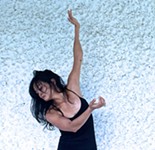Here Today ...
Choreographer Sharon Marroquín lets go through dance in order to live
By Jonelle Seitz, Fri., March 23, 2012
(Page 2 of 2)
Foreign Puzzle
Around the time Marroquín began jotting down images in a notebook, she realized she was ready to meet other survivors. At a luncheon of the Pink Ribbon Cowgirls, a group of young breast cancer survivors, someone suggested she find someone to film her process and the final dance project. Having a video record of a dance is never a bad idea, so Marroquín sent an email to the University of Texas's film department in search of a student who might document her project.
She did not suspect that email would result in her being filmed at home, doing the dishes, and reading Dalí his bedtime stories; losing consciousness after receiving an emergency blood-thinning shot at the hospital; and in the studio, blocking Dalí's runaway toy cars before they reached her students' feet while creating and rehearsing. Chithra Jeyaram, the film M.F.A. candidate and maker of social documentaries who answered Marroquín's query, wasn't interested in simply documenting the dance. She wanted to document Marroquín's life.
The resulting film-in-progress is called Foreign Puzzle, which is how Marroquín has described her post-cancer body, and a short, "Mijo," which focuses on the cancer's effects on Marroquín's relationship with Dalí, has garnered attention at several festivals (most recently, "Mijo" was part of Austin Film Society's ShortCase at South by Southwest). Jeyaram says she was interested to show what happens after treatment and how Marroquín as an artist deals with cancer's lingering "assault on your emotions and mind." By breaking emotions down to physical movements, Jeyaram has observed over countless hours that Marroquín seems to externalize them in a therapeutic way.
I Do, We Do, You Do
It was a year after jotting down her first ideas that Marroquín hired her first dancer: student Ciara Walsh, then 11 years old. In the section Ciara dances with Marroquín, she represents both Marroquín's child and her child self. In the duet, which they performed at last year's Big Range Austin Dance Festival, the adult and child gently lay their limbs over each other as they sleep. Once they rise, they move through a pedagogical structure – I do, we do, you do – suggesting the passing on of knowledge, of methods for enjoying life.
Ciara's character also represents the considerable number of students whose lives Marroquín touches, both as a second-grade bilingual teacher for the Austin Independent School District and as a dance instructor at Tapestry Dance Company's academy. In this role, she feels – and accepts – a fierce responsibility for her students, and she compares teaching to motherhood. During several combined hours of conversation with Marroquín, the only time I saw her really tear up was when she admitted the probability that one in every eight of her female students will develop breast cancer.
What's harder than letting go of one's own expectations in life? Letting go of people. "In particular," Marroquín says, with measured pacing, "my son." In "Mijo" (the trailer can be viewed at www.vimeo.com/27631896), Dalí stands on her bed as Marroquín tries to take a nap after a chemotherapy treatment. Dalí, a fresh cast on his arm, twirls and jumps in the dark dance studio parking lot as they're leaving to go home. Dalí, cocooned in a hammock, tells us quite clearly his beautiful, perfect understanding of death: "You're like going to bed, but you can't wake up. You never wake up."
In Marroquín's duet with Ciara, as they seem to sleep, the adult suddenly holds the child tightly, lifting her atop her own body as if to protect her from everything. Later, in their playful dance together, Marroquín's character takes advantage of moments when she's able to hold onto the child, clasping her waist for an extra moment before Ciara breaks free. But, Marroquín says, she has been able to loosen even this clasp. It happened in a yoga class, she says. "In the relaxation time, I was thinking about my son and clinging in a way, not wanting to let him go and not wanting to die because I don't want to let him go," she says. "And then suddenly, I had an image or a certainty that his spirit is strong and that he would be OK without me. I breathed a sigh of relief. And ever since that moment, I am even more OK with dying, because I know that he will be OK."
Collaboration and Solitude
The decision to work with Ciara, her student for several years, was an easy one. "I spent a lot of time thinking about who I wanted to work with," remembers Marroquín. It was important to her that everyone involved – not just the dancers but also the design and production crew – understood the personal significance of the project. Although everyone involved in the professional project is getting paid thanks to Marroquín's tireless Kickstarter campaigning and grant-chasing (and the help of sponsoring organizations such as Women & Their Work and VSA Texas), she didn't want to work with anyone who saw the project as just another gig. "I told everyone, 'Only say yes to this project if you would do it for free'," she says. Among those who said yes are lighting designer Stephen Pruitt and scenic designer Ia Ensterä. Costumes are by Jamie Rhodes, and Jessi Clayton is working with Todd Wolfson on video elements. The music is recorded; many tracks, like the ones from an album her sister sent her when she was in the midst of chemotherapy, have special significance for Marroquín.
Besides Ciara and Marroquín, seven local dancers chosen for their depth, passion, and intelligence comprise the core cast of Materiality. But they will be joined at various points in the work by an aerialist from Seattle, several local breast cancer survivors, and Marroquín's sister, a dancer who lives in Massachusetts. The absence of men in the cast is intentional, Marroquín notes on her blog, www.thematerialityofimpermanence.wordpress.com. In the blog post, she explains how she dropped the idea for a male-female duet when she realized it didn't parallel her life, and she refers to a larger phenomenon, known as "the cancer kiss-off," in which some women witness the men in their life scattering when they hear the C-word.
And while it's true that trying to accept the fact of impermanence might benefit us all, and while the impressive assembly of performers will no doubt support progress in empathy, making connections, and destigmatizing cancer, Marroquín acknowledges that the journey to acceptance is inevitably solitary. In one section of Materiality, a solo that Marroquín has excerpted for recent performances, her burden is made concrete with an impossibly heavy and inconvenient piece of vintage luggage. Video by Wolfson renders Marroquín a Chaplin-esque silent-film character as she engages in a Sisyphean struggle to move the suitcase. A heavier theatrical hand might have chained the suitcase to her. But though the tie between the suitcase and Marroquín remains unseen, it is indissoluble, the object's presence leaden.
The suitcase metaphor is characteristic of Marroquín's devices: simple, direct, and brilliant. And the section is not without lightness and humor. At one point in her attempts to manage the suitcase, Marroquín's character upends it, straddles it, and begins to circle her legs as if she were pedaling a bicycle. While it's not a permanent solution for the heavy burden – is there one? – her face brightens, her chin juts forward, her eyes alight, and for a moment, there she remains.
The Materiality of Impermanence will be performed March 23-25, Friday, 8pm, Saturday, 2 & 8pm, and Sunday, 2pm, in the Rollins Studio Theatre at the Long Center, 701 W. Riverside. The Saturday matinee is free for cancer survivors and will be followed by a panel on art and healing. For more info, call 474-5664 or visit www.longcenter.org.













